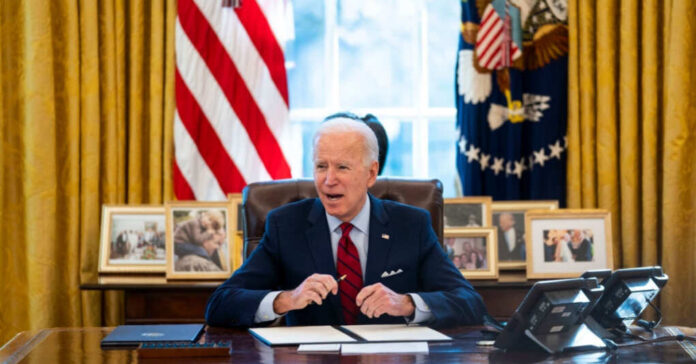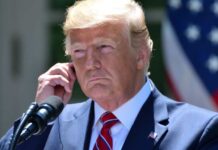
Unless they are living under a rock or are staunch Democrats, most Americans have been hearing about a mysterious FD-1023 form that links the Biden name with foreign nationals, bribery, policy-making decisions, and other high-level corruption. The criminal activity allegedly took place while Biden was sitting in the Vice-President’s seat.
It’s a lot of information, and many are confused as to what the document is, what it contains, and how it impacts an ongoing House Oversight Committee’s investigation into Biden’s alleged corruption.
Here is a breakdown of what Americans need to know to stay up to speed on the FD-1023 in question and how a simple form caused a firestorm on Capitol Hill.
The wild ride started with rumors of the existence of an FD-1023 form, full of allegations from an informant who had conversations with foreign nationals involved in criminal activities with then-Vice President Joe Biden.
The FBI defines an FD-1023 as “one of many forms the FBI uses to collect and catalog information for its law enforcement and national security work.” The form, used by agents “to record unverified reporting from a confidential human source,” is a highly sensitive document.
House Oversight Committee Chairman James Comer (R-KY) requested the unclassified FD-1023 form to investigate allegations that a well-respected and reliable informant made about Biden and possible criminal activities. Per Comer, the informant is “highly credible” and has been “part of the bureau for 13 years.”
Comer was seeking the document along with all other FD-1023 forms created or modified in June 2020 that contain the word “Biden.” Because the document in question contains “two footnotes in there that referenced other 1023s,” he expanded his subpoena from the single form to include all related documents and FD-1023 forms.
Comer and Sen. Chuck Grassley (R-IA) believe the document is an important piece of evidence into the Biden family’s ties to foreign national criminal schemes, including bribery and money laundering, based on “highly credible unclassified whistleblower disclosures.” In other words, the whistleblower alerted committee members that a separate informant had revealed information used on the FD-1023 in question in 2020.
In particular, the whistleblower alleges that the contested FD-1023 may outline a criminal scheme involving the exchange of money between foreign nationals and then-Vice President Biden in exchange for policy decisions.
Congressional Republicans who gained access to the file claim that it detailed two $5 million transactions from the owner of Ukrainian natural gas company Burisma Holdings, one to Hunter Biden and the other to then-Vice President Biden.
But without the form in hand and the ability for all members to see the document, the House Oversight Committee would be unable to enter the evidence into consideration.
The FBI has refused to release the form for many reasons, switching tactics as necessary to ensure the document would never see the light of day. Initially, the FBI had denied the form existed at all. Contrary to that claim, however, Comer and Grassley (R-IA) physically viewed the document and were aware of both its existence and its content.
“We had whistleblowers approach Senator Grassley about their concern that there was this form 1023 in existence and the FBI had never investigated it,” Comer recalls. “Senator Grassley and I got on the phone with Director Wray, and Senator Grassley told Director Wray that both Senator Grassley and myself had already read the form 1023 from a whistleblower, so we knew darn well it existed.”
The FBI then changed its tune, confirming that the document existed but that for the safety of the informant could not be released. Per officials, “Confidential human sources often provide information to the FBI at great risk to themselves and their loved ones. Protecting the identities and information provided by confidential human sources from unnecessary disclosure or undue influence is therefore critical not only because of safety concerns but also to avoid chilling their candor or willingness to continue reporting to the FBI.”
The FBI appeared to be using Department of Justice policies to block Comer’s access. These policies “strictly limit when and how confidential human source information can be provided outside of the FBI” and have been in place for decades.
The next ploy the FBI used to obstruct the investigation was a claim that the form contained “unverified reporting by a confidential human source,” further claiming that the bureau could not justify giving it to the committee. This strategy relied heavily on “there’s nothing to see here.”
But the committee needed to see the documents for themselves to verify them, and the investigation stalled because of FBI Director Christopher Wray’s refusal to release the documents.
Comer and other members of the House Oversight Committee threatened to hold Wray in contempt for his weeks-long obstruction and refusal to release the documents. Wray’s contempt hearing was scheduled for June 15, but the stand-off ended last week when Wray finally agreed to release the form in question, as well as several others, to the entire investigative committee.
Comer reported on Monday that “the FBI has told me there are more 1023 forms” and promised, “I will be granted access to these additional docs. [The committee] will get answers.”
It’s important to note that the FBI was in possession of the FD-1023 in 2020, right in the middle of the election cycle. It, like Hunter’s laptop, was hidden from the public and the FBI did not complete a thorough investigation into the allegations contained in the document.
As for what is contained in the documents, Comer has been playing it close to the vest and releasing only limited amounts of information.
“Here’s what we know,” Comer revealed. “There are 20 shell companies at least, and probably more, that were laundering money from foreign nationals, including Romania, and money was being sent less than two weeks after Joe Biden left there as vice president, delivering foreign aid and talking about foreign policy.” Comer went on to explain, “This form 1023 alleges the exact same thing happened in Ukraine.”
Comer described the allegations within the FD-1023 as “consistent with what we found and disclosed to you all in Romania,” noting that “It suggests a pattern of bribery where payments would be made through shell accounts and multiple banks.”
Comer goes on to note, “The allegations contained within this record track closely with the Oversight Committee’s investigation of the Biden family’s influence peddling schemes,” adding, “The Oversight Committee will continue to follow the facts and ensure accountability for the American people.”
The FBI had initially claimed the investigation into the allegations contained on the FD-1023 had officially been closed and had no merit, in more recent statements the agency is now claiming the investigation is still ongoing.
It seems that while Democrats are celebrating that the walls are finally “closing in” on former president Trump after numerous investigations, the rug is being pulled out from underneath their own president.















